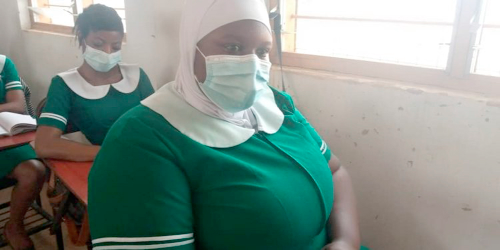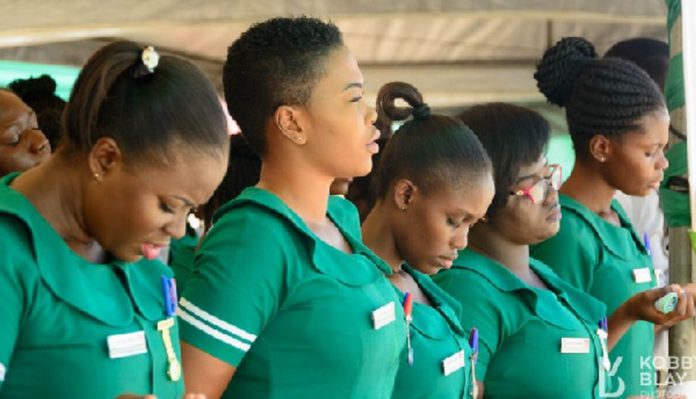Not even her disability and challenges can stop her from pursuing her dream of becoming a professional nurse to be able to serve persons living with hearing impairment.
Ms Issahaku Zakia, a 25-year-old student, with hearing impairment, has defied all odds and is currently studying Diploma in Nursing at the Community Health Nursing Training College (CHNTC) in Tamale in the Northern Region.

She completed the Mampong-Akwapem Senior High School (SHS) for the Deaf in 2018. Ms Zakia’s dream of becoming a nurse began after the CHNTC offered her an admission to study nursing in 2019 following an impressive performance she displayed during an interview session.
However, her predicament started after her admission to the school as she continuously struggled with her studies because of the lack of an interpreter to regularly guide her in class during lessons.
The school has no sign language interpreter to help students with hearing impairment during lessons, but the hearing-impaired student is unable to afford the service of a permanent interpreter to regularly assist her.
Ms Zakia, whose parents are petty traders, managed to hire the service of an interpreter for only the first year but was unable to sustain the financial commitment of paying for the services of the interpreter throughout the three-year programme.
Challenges
Speaking to the Daily Graphic in an interview, the Second-Year nursing student said she had refused to allow her disability to put an impediment in her way.
“I don’t want to be a burden on society and so I am determined to make it, but the lack of an interpreter is making learning very difficult for me even though I am brilliant and have interest in becoming a professional nurse.
“Because I am not able to pay the interpreter, he is now volunteering and does not come always, anytime we have lectures and he is absent, it means that I cannot take part in that lesson,” she said.
She said aside from the lack of an interpreter, she was also unable to pay her tuition fees and had no hope of raising the fees for the rest of the academic years, adding that she did not have a laptop, which was affecting her studies.
The hearing-impaired student appealed to the government, benevolent organisations and philanthropists to come to her aid to enable her realise her dream and contribute her quota to national development.
Hearing-impaired nurses
Although many of persons with disabilities are often marginalised or discriminated against in almost all levels of national development, especially in the education sector, she has defied the odds to make herself relevant to society.
Checks by the Daily Graphic revealed that since independence, Ghana has not produced any deaf person as a medical doctor or a nurse due to the barrier of communication in sign language and mode of teaching in the schools.
Since the introduction of the sign language curricula into the nursing and midwifery training schools by the Nursing and Midwifery Council in 2014, not a single deaf person has been trained as a nurse, though the idea was to help deal with the challenges faced by the deaf community when they visit health facilities and to make professional medical training accessible to them.
Necessary facilities
When contacted, the Principal of the Community Health Nursing Training College, Madam Comfort Kona, emphasised the need for the government to provide the necessary facilities and interpreters, not only for the Community Health Nursing Training College, but all other institutions across the country.
That, she said, would enable students who were brilliant but physically challenged to enrol in the tertiary training institutions to read professional programmes for their career development. She added that her outfit would continue to give equal opportunities to all persons irrespective of their status.
Disability Act
The Ghana Persons with Disability Act, 2006 Act 715 provides for all Ghanaians living with any form of disability the right to health care and medical treatment, however, access to quality health care continues to be a major challenge.
The Act states that “The Ministry of Health shall include the study of disability and disability related issues in the curricula of training institutions for health professionals to develop appropriate human resources to provide general and specialised rehabilitation services. The Ministry of Health shall include education on disability and disability issues in healthcare programmes.”

